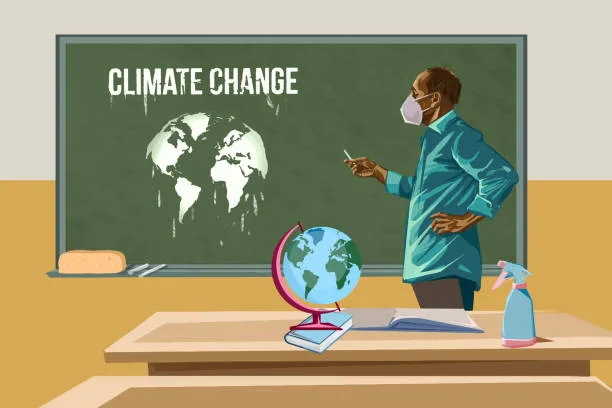Education Systems Ill-Prepared to Face Climate Change – Report.
A recent report has revealed that education systems worldwide are inadequately equipped to cope with the impacts of climate change.
The report, titled Learning Interrupted: Global Snapshot of Climate-Related School Disruptions in 2024, released by UNICEF on the International Day of Education, highlights a severe lack of climate-centered investments in education.
Despite the growing necessity for resilient infrastructure and emergency preparedness, efforts remain critically low.
UNICEF’s report identifies a significant gap in global data collection regarding school disruptions caused by climate hazards. This shortfall hinders the creation of effective policies and targeted solutions.
According to the findings, climate-related disasters such as heatwaves, cyclones, floods, and storms disrupted the education of nearly 250 million children globally in 2024.
These events were the primary causes of school closures and interruptions, underscoring the vulnerability of educational systems to climate change.
Regional Impacts: Kenya and Beyond
In Kenya, over 2 million learners experienced setbacks as heavy rains and widespread flooding during the March to May long rain season wreaked havoc.
Floodwaters severely damaged school infrastructure, including classrooms, sanitation facilities, and playgrounds, while destroying essential teaching and learning materials.
Many children were forced to remain at home for weeks, exacerbating existing educational inequalities in vulnerable communities. Counties such as Kisumu faced dire conditions, with schools like Odienya, Oseth, and Nyamurundu Primary entirely submerged.
The report also highlights the disproportionate impact on low- and lower-middle-income countries, where 74% of the affected students reside. However, wealthier nations were not spared. For instance:
- Italy: Torrential rains in September disrupted education for over 900,000 students.
- Spain: October floods led to class suspensions for 13,000 children.
Immediate Interventions and Long-Term Challenges
In response, UNICEF and other organizations have provided temporary learning spaces, educational materials, and psychological support to affected children. However, the scale of these disasters emphasizes the need for sustained efforts to rebuild and enhance educational infrastructure.
- Consequences of Prolonged Disruptions:
- Reduced learning opportunities
- Increased dropout rates
- Widening educational inequalities
For girls, the risks are even greater, as extended absences often create additional barriers to returning to school.
Read Also: P1 to JSS Deployment: TSC to Begin Verification and Posting Process
Recommendations for Resilient Education Systems
UNICEF calls for urgent action to integrate education into climate adaptation and resilience strategies. Key recommendations include:
- Increased Funding: Allocate resources for climate-resilient school infrastructure.
- Curriculum Integration: Include climate education to raise awareness and preparedness.
- Robust Tracking Systems: Develop mechanisms to monitor and address school disruptions due to natural disasters.
UNICEF emphasized the importance of prioritizing education systems in climate resilience planning, stating that every child deserves uninterrupted access to learning, regardless of climate challenges. The organization urged immediate efforts to fortify education systems against future disruptions.
Education Systems Ill-Prepared to Face Climate Change – Report.
Follow Teachers Updates on Facebook, LinkedIn, X (Twitter), WhatsApp, Telegram, and Instagram. Get in touch with our editors at [email protected].


Discussion about this post